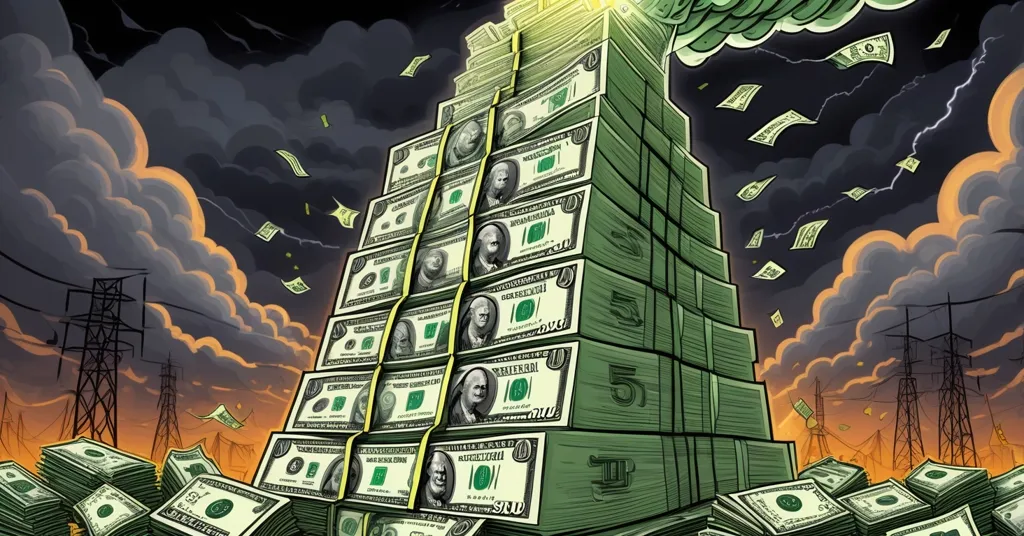Trump’s $5 Trillion Bill Passes Senate Vote: Bitcoin Mining Faces Energy and Inflation Risks

Trump’s $5 Trillion Bill Clears Senate Hurdle: Bitcoin Mining and Crypto Face Uncertain Fallout
President Donald Trump’s sprawling $5 trillion legislative package, self-branded as the “big, beautiful bill,” has scraped through a Senate procedural vote with a nail-biting 51-49 margin. Packed into 940 pages of policy upheaval, this beast of a bill touches everything from healthcare to energy—and while crypto isn’t explicitly mentioned, the shockwaves could hit Bitcoin mining and decentralized tech harder than a market dump. Let’s unpack the chaos and zero in on what it means for our space.
- Narrow Victory: Senate procedural vote passes 51-49 amid Republican infighting and unanimous Democratic opposition.
- Policy Flashpoints: Includes Medicaid cuts, a $5 trillion debt ceiling hike, and a gutting of clean energy tax credits.
- Crypto Stakes: Energy shifts and fiscal moves could jolt Bitcoin mining costs and drive inflation-hedge narratives.
The Senate Showdown: A Political Mess with Big Stakes
The Senate vote was a masterclass in political brinkmanship. Despite a Republican majority, two GOP senators—Thom Tillis of North Carolina and Rand Paul of Kentucky—sided with every single Democrat to oppose moving the bill forward. Tillis zeroed in on the bill’s Medicaid cuts, which slash the cap on provider taxes states use to pull federal healthcare funds. Plainly put, this could strip billions from states like North Carolina, potentially leaving hundreds of thousands without coverage. For more on Tillis’ stance and the funding impact, check out this detailed report on his opposition.
“I told the president I couldn’t support this because of the Medicaid language. It would result in tens of billions of dollars in lost funding for North Carolina. This will force the state to make painful decisions like eliminating Medicaid coverage for hundreds of thousands in the expansion population,” Tillis warned.
Rand Paul, meanwhile, balked at the jaw-dropping $5 trillion debt ceiling hike—a move that lets the government borrow more to cover its spending, often stoking fears of inflation or currency devaluation. Sound familiar? It’s the kind of fiscal recklessness that’s pushed many into Bitcoin’s arms as a hedge. Yet, Trump and his White House crew managed to flip several GOP holdouts—Mike Lee of Utah, Rick Scott of Florida, Cynthia Lummis of Wyoming, and Ron Johnson of Wisconsin—through relentless lobbying. Even then, the process reeked of rushed, old-school politics, with some senators griping about getting the text in the dead of night. For deeper insight into the tight 51-49 vote and senator flips, see this analysis of the Senate showdown.
Democrats, under Senate Minority Leader Chuck Schumer, are playing hardball to stall. They’re forcing a full reading of the 940-page bill—about 15 hours of mind-numbing recitation—followed by 20 hours of debate and a chaotic “vote-a-rama” on amendments. Schumer’s intent is clear: expose the bill’s uglier bits to the public. To understand the broader context of this legislative push, take a look at this update on the bill’s advancement.
“Senate Republicans are scrambling to pass a radical bill, released to the public in the dead of night, praying the American people don’t realize what’s in it,” Schumer fired off.
Trump’s pushing to sign this by July 4, a deadline dripping with symbolic intent, but the road ahead is brutal. Further Senate debates and a return to the House loom, with no guarantee of smooth sailing. Even GOP Senator Susan Collins of Maine, who voted to start debate, isn’t sold on the final product. The political stakes are sky-high, but let’s cut through the noise and focus on where this intersects with crypto.
Energy Policy Shifts: A Gut Punch to Bitcoin Mining?
One of the bill’s most contentious moves is its rollback of Biden-era clean energy tax credits, setting impossible timelines—projects must break ground within 60 days of passage and produce power by 2028—while shielding oil and gas incentives. This has tech titan Elon Musk, a familiar face in crypto circles for his Bitcoin and Dogecoin antics, spitting fire. For Musk’s sharp take on the rollback’s impact, read this critique of the energy policy changes.
“Utter madness” and “political suicide for the Republican Party,” Musk raged, slamming the abrupt end to credits for electric vehicles and solar projects.
Why should Bitcoiners care? Mining—the energy-intensive process of validating transactions on the Bitcoin network by crunching complex math with beefy hardware—often leans on cheap, renewable energy to keep costs down and dodge environmental backlash. Recent estimates peg around 50% of global Bitcoin mining as powered by renewables, with hubs like Texas balancing wind and fossil fuels. If green credits vanish, miners could face steeper operational costs, especially in regions reliant on solar or wind subsidies. Hash rates might dip, profitability could tank, and smaller operators might get squeezed out faster than a rug-pulled altcoin. For a broader perspective on mining’s energy footprint, explore this resource on Bitcoin’s environmental impact.
Let’s not overplay the doom, though. Some mining outfits are already pivoting to off-grid solutions or striking deals with fossil fuel providers—Trump’s clear priority. And Musk’s influence, paired with his Department of Government Efficiency (DOGE, a cheeky nod if there ever was one), might nudge future tweaks to support energy-efficient blockchain tech. Still, right now, this bill looks like a headwind for an industry already under scrutiny for its carbon footprint. For a specific breakdown of how these energy policies could affect miners, check out this analysis of mining cost implications.
Debt Ceiling Drama: Bitcoin as the Inflation Hedge?
That $5 trillion debt ceiling hike isn’t just a political football—it’s a red flag for anyone tracking economic stability. Historically, debt ceiling showdowns—like those in 2011 and 2013—have sparked inflation fears, with Bitcoin often spiking as a perceived safe haven. When governments bloat the money supply, devaluing fiat, a trustless, capped-supply asset like BTC starts looking mighty attractive. If this bill passes, expect chatter about “Bitcoin as digital gold” to heat up again, potentially driving adoption among inflation-wary investors. For a community perspective on how debt ceiling hikes might influence crypto, see this discussion on cryptocurrency investments and debt defaults.
But let’s pump the brakes on the hopium. Bitcoin’s volatility can shred portfolios quicker than a leveraged shitcoin trade if markets panic over debt fallout. And while a weaker dollar might boost BTC’s allure, it doesn’t guarantee a moonshot—correlation isn’t causation, and macro conditions like interest rates or recession fears could still drag crypto down with the broader economy. The debt debate underscores why decentralized systems matter, but they’re not a magic bullet for systemic rot.
Policy Openings: A Crypto-Friendly Future or Regulatory Trap?
Here’s where a sliver of optimism creeps in. Trump’s past flirtations with crypto—think NFT drops and pro-Bitcoin tweets—plus Musk’s clout, hint at potential for blockchain-friendly policies down the line. Could amendments to this bill, or a follow-up package, sneak in incentives for decentralized tech? Imagine tax breaks for miners using domestic energy grids or nods to DeFi innovation as a counter to centralized fiscal bloat. Even Ethereum, with its energy-efficient Proof-of-Stake model post-Merge, could carve out a niche as a complementary force to Bitcoin’s store-of-value narrative in this new political landscape. For some speculative takes on the bill’s implications for Bitcoin mining, browse this Reddit thread on crypto-related fallout.
Don’t bet the farm on it, though. Fiscal hawks like Rand Paul, already fuming over spending, might lump “unregulated” crypto into their broader distrust of anything smelling like innovation. And if energy policy stays hostile to renewables, mining operations—Bitcoin’s backbone—could face tighter scrutiny or outright bans in eco-conscious states. We’re all for effective accelerationism and disrupting the status quo, but navigating this political minefield requires clear-eyed realism. Centralized overreach, whether through debt or regulation, is the enemy—yet decentralization isn’t immune to collateral damage from bills like this.
The Bigger Picture: Decentralization vs. the Machine
This $5 trillion behemoth is more than a policy fight; it’s a litmus test for the clash between centralized control and individual freedom. A government willing to borrow trillions while gutting innovation-friendly incentives is the exact kind of legacy system Bitcoin was built to challenge. Yet, the path forward isn’t a straight line. Energy cost spikes could throttle mining, inflation fears might boost adoption, and policy wildcards—whether from Trump’s camp or Musk’s orbit—keep us guessing.
As Senate debates rage and the bill heads toward a House reckoning, we’re left with a messy snapshot of governance in crisis. Will this legislation choke crypto’s growth, or could it inadvertently fuel the case for trustless systems as the antidote to fiscal insanity? We’re watching closely, because in a world drowning in debt and bureaucracy, decentralization isn’t just a tech trend—it’s a lifeline.
Key Takeaways and Questions for Crypto Enthusiasts
- What’s the latest on Trump’s $5 trillion bill?
It narrowly passed a Senate procedural vote 51-49, but faces intense debate, amendments, and a final vote before returning to the House for approval.
- How might energy policy changes hit Bitcoin mining?
Scrapping clean energy tax credits could spike costs for miners using renewables—about 50% of the industry—potentially cutting profitability and slowing growth in key hubs like Texas.
- Why does the debt ceiling hike matter to crypto investors?
A $5 trillion increase could fuel inflation fears, historically pushing investors toward Bitcoin as a hedge against fiat devaluation, though volatility remains a risk.
- Is there hope for crypto-friendly policies from Trump or Musk?
Trump’s past pro-crypto stance and Musk’s influence open the door for future blockchain incentives, but fiscal conservatives and regulatory risks could slam it shut.
- What’s the broader significance for decentralization?
This bill highlights centralized overreach—massive debt and legacy priorities—reinforcing the need for Bitcoin and decentralized systems as counters to systemic flaws.



